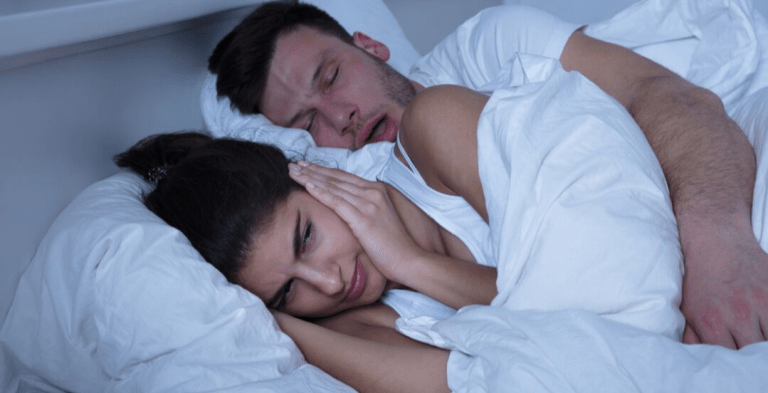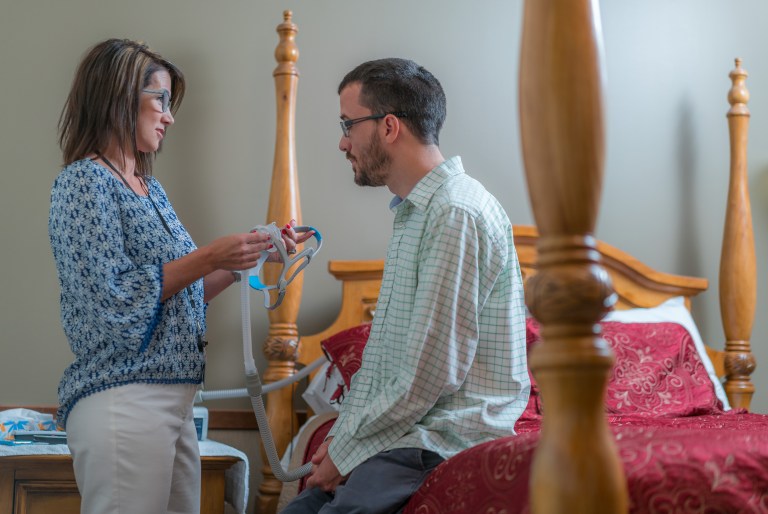Is It Just Snoring or Obstructive Sleep Apnea?
- Category: Preventative Healthcare
- Posted On:

Snoring (or sleeping next to a snorer) is incredibly common. In fact, 45% of adults snore occasionally and up to 25% of Americans are habitual snorers. Snoring is more frequent in males and those who are overweight. As we age, our snoring typically worsens. Sometimes snoring points to a bigger problem: obstructed breathing. Here’s how to identify if your snoring habits should be evaluated by a doctor.
What Causes Snoring?
When there is some kind of obstruction the air is not able freely flow through the passages at the back of the mouth and nose, this causes the loud sounds. This area is where the tongue and upper throat meet the soft palate and uvula. Snoring occurs when these structures strike each other and vibrate during breathing.
Common causes of snoring:
- Poor muscle tone in the tongue and throat: When muscles are too relaxed, the tongue falls backwards into the airway. Some relaxation is natural during deep sleep, but too much relaxation may become a problem.
- Excessive bulkiness of throat tissue: Children with large tonsils and adenoids often snore. Overweight people may have excess soft tissue in the neck that can lead to airway narrowing.
- Long soft palate and/or uvula: A long palate narrows the opening from the nose into the throat. The excessive length of the soft palate and/or uvula acts as a noisy flutter valve during relaxed breathing.
- Obstructed nasal airways: A stuffy or blocked nose requires extra effort to pull air through it. This creates an exaggerated vacuum in the throat that pulls together the floppy tissues of the throat, and snoring results. Snoring often occurs during hay fever season or with a cold or sinus infection.
- Deformities of the nose or nasal septum: Such as a deviated septum (a deformity of the wall that separates one nostril from the other) can cause such an obstruction.
How is Obstructive Sleep Apnea Different?
Snoring may be a sign of a more serious condition known as obstructive sleep apnea (OSA).
OSA is where there are multiple episodes of breathing pauses greater than 10 seconds at a time. This results in lower amounts of oxygen in the blood, which causes the heart to work harder. It also disturbs the natural sleep cycle, which makes people feel tired and under-rested.
Why is OSA Concerning?
The immediate effect of obstructive sleep apnea is that the snorer must sleep lightly and keep the throat muscles tense in order to keep airflow to the lungs.
Since the snorer does not get good rest, he/she may be exhausted or tired during the day, which decreases job performance and makes him/her a hazardous driver. Untreated obstructive sleep apnea increases the risk of developing severe health conditions including; heart attacks, strokes, and diabetes to name a few.
How is Heavy Snoring Evaluated?
If you are told you’re a heavy snorer, you should consult with your physician to ensure that sleep apnea is not a problem.

Heavy snorers are people who snore constantly in any position. An ear, nose and throat (ENT) doctor will examine the nose, mouth, throat, palate, and neck. Upon examination, your doctor can reveal if the snoring is caused by nasal allergy, infection, nasal obstruction, or enlargement of tonsils and adenoids. You may also be scheduled for a sleep study.
Snorers with any of these symptoms should make an appointment for evaluation:
- Witnessed episodes of breath pauses or apnea during sleep
- Daytime sleepiness or fatigue
- High blood pressure
- Heart disease
- History of a stroke
Treatment for obstructed sleep apnea depends on the diagnosis and level(s) of upper airway narrowing. In some cases, more than one area may be involved.
The most common treatment for OSA includes the use of a CPAP, a device that opens the airway with a small amount of positive pressure. Check out our available OSA devices in this episode of The Scope. Ogden Clinic also provides a new option for eligible patients called the Inspire Sleep Apnea Implant. In some patients, weight loss can also improve OSA.

To schedule a visit to evaluate your snoring, please give us a call at 801-475-3000 or schedule online. Our ENT department has three locations in Bountiful, Layton, and Ogden, Utah.